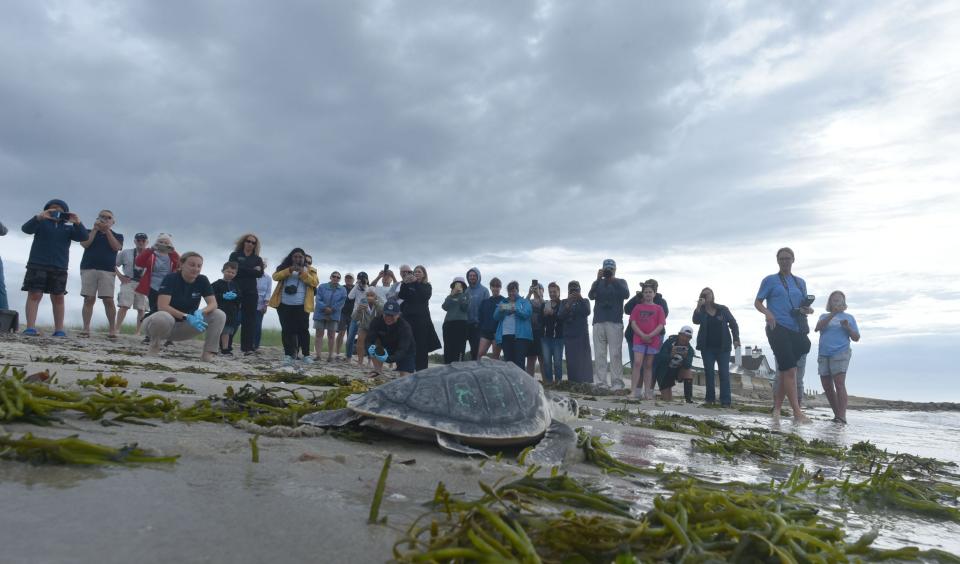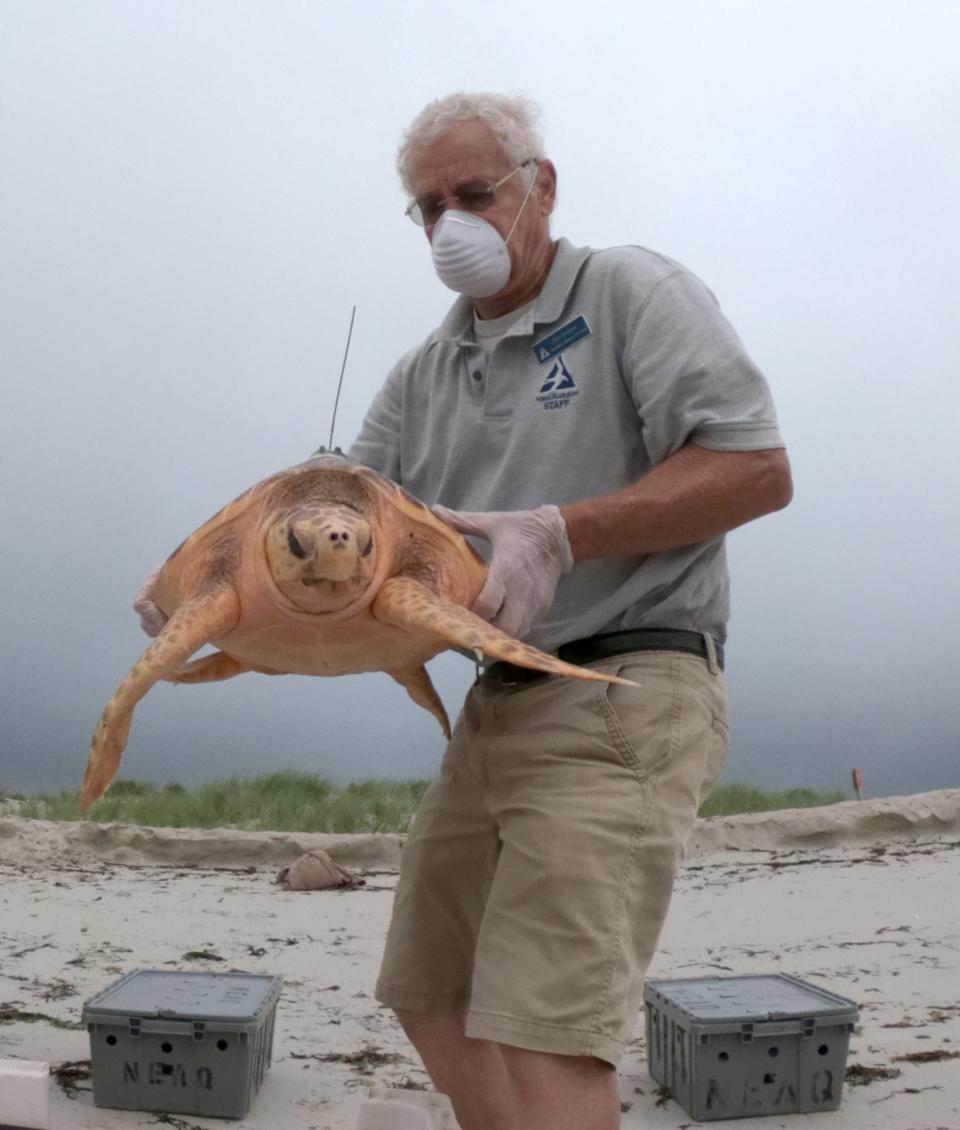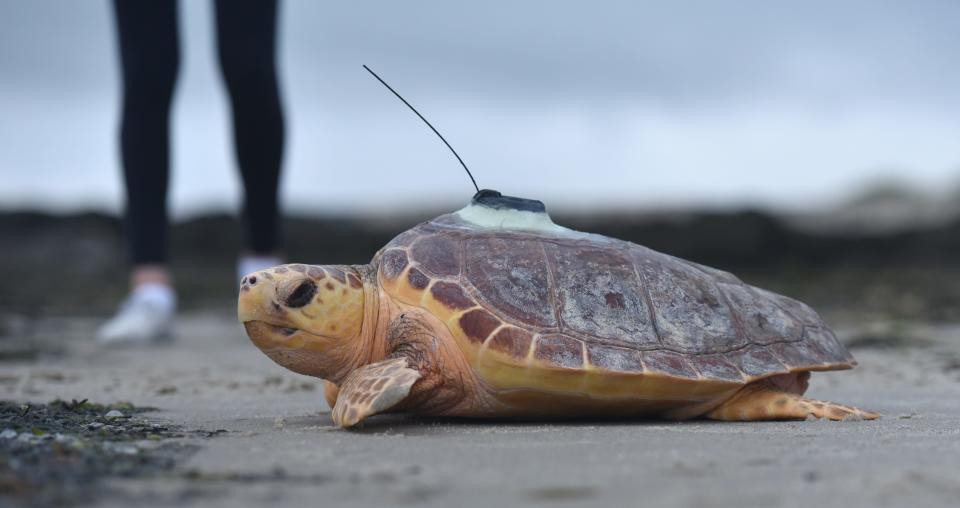Nearly 1,000 sea turtles wash up on Cape beaches each year. What Congress can do about it.
In a win for endangered sea turtles, new legislation aimed at supporting important rescue and rehabilitation work around the nation has won approval from the U.S. House of Representatives — particularly good news for conservationists who annually see some of the highest numbers of cold-stunned turtles washing up on Cape Cod beaches.
The bipartisan Sea Turtle Rescue Assistance and Rehabilitation Act (H.R.2560) was passed in the U.S. House on April 11 with a 332-82 vote; 16 members of the House did not vote. The bill, which next moves on to the Senate, was introduced by Congressman William Keating a year ago.
"It needed a two-thirds vote and we were successful in getting greater than two thirds, which isn't easy to get these days," said Keating, speaking by phone on Friday.

What does the bill do for sea turtles?
The bill creates a new grant program through the National Oceanographic and Atmospheric Administration to support the work of institutions that participate in the National Park Service's Sea Turtle Stranding and Salvage Network as they seek to rescue and rehabilitate endangered sea turtles that have become entangled or stranded, he said.
"It was supported by 72 organizations in 27 states. It's a national issue, but an issue in Cape Cod more than any other region of the country," Keating said.
The World Wildlife Fund points out that nearly all sea turtle species worldwide are endangered and, Keating noted, all recognized species of sea turtles found within the United States are considered threatened or endangered. The sea turtle rescue act, he said, will help to provide support to organizations — like the National Marine Life Center, New England Aquarium and Mass Audubon’s Wellfleet Bay Wildlife Sanctuary — already working to preserve the nation's sea turtle population.
Cape Cod Bay has become a hotspot for sea turtle strandings.
Between 2020 and 2023, the number of cold-stunned turtles rescued from Cape Cod beaches during the late fall and winter rose from 50 to 900. Rescuers have retrieved many critically endangered Kemp's ridley turtles from Cape shores, as well as endangered green sea turtles, and vulnerable leatherback and loggerhead sea turtles.
"It's a very alarming increase in just a short time," Keating said.
Climate change has a role in the increased strandings. Warming ocean temperatures linger in Cape Cod Bay longer every year, resulting in sea turtles misreading cues to begin migrating south in the fall and winter. When water temperatures fall suddenly, many turtles become stranded. They are vulnerable to hypothermia, as well as to increased chances of predation because they cannot move around as easily.

"The resources provided by this bill will go a long way to saving the lives of these turtles," said Keating, pointing out the importance of ensuring the health of sea turtle population not only to preserve biodiversity, but also because of the role sea turtles play in maintaining healthy marine ecosystems and in the eco-tourism industry.
When researchers and conservationists have the ability to intervene and rehabilitate cold-stunned and entangled sea turtles, Keating said, it improves the survival rate. More than two-thirds of rescued turtles survive to be released back to the sea and reproduce.
"Sea turtles are an important part of our marine ecosystem here on Cape Cod and financial assistance to manage the mass casualty, cold stunning events of nearly 1,000 turtles a season is essential to our conservation efforts," said Connie Merigo, president and executive director of the National Marine Life Center in Buzzards Bay.
While sea turtles are protected under the federal Endangered Species Act, the organizations that work to save them agree there is presently "inadequate direct federal support" to help manage the high costs of sea turtle stranding response and rehabilitation.

Karen Moore Dourdeville, sea turtle research coordinator for Mass Audubon’s Wellfleet Bay Wildlife Sanctuary, said the House's passage of the Sea Turtle Rescue Act is "a big step closer to creating a permanent grant program to support organizations responding to and caring for endangered and threatened sea turtles."
"Mass Audubon Cape Cod operates its Sea Turtle Rescue and Research Program with the help of staff and up to 200 trained volunteers who patrol beaches, day and night, to rescue these threatened and endangered turtles and transport them to rehabilitation facilities," she said. "Ultimately, most recover from being cold-stunned and are released back into their ocean home, to grow, thrive and reproduce."
The federal funding, she said, "could significantly help Mass Audubon Cape Cod and other non-profit organizations in their efforts to rescue and rehabilitate sea turtles."
The New England Aquarium, in partnership with National Aquarium and South Carolina Aquarium has been working with Keating, as well as U.S. Sen. Ed Markey, D-MA; Sen. John Cornyn, R-TX, and Rep. Jenniffer Gonzalez-Colon, R-PR, to pass the legislation.
"It is time for Congress to adequately support those who have voluntarily helped the federal government fulfill its mandate under the Endangered Species Act to conserve and recover sea turtle species," said New England Aquarium President & CEO Vikki N. Spruill, National Aquarium President & CEO John Racanelli, and South Carolina Aquarium President & CEO Kevin Mills in a joint statement issued Friday afternoon. "To continue this critical sea turtle rescue, recovery and research, organizations like ours across the country need sustained federal support. We encourage the Senate to act quickly to pass this bipartisan legislation.”
Keating said he feels confident the bill will find success in the Senate, too.
"We're hopeful the Senate will take this up and move forward by the end of the year," he said. "The good news is, there is support."
Heather McCarron writes about climate change, environment, energy, science and the natural world. Reach her at hmccarron@capecodonline.com, or follow her on X @HMcCarron_CCT
Thanks to our subscribers, who help make this coverage possible. If you are not a subscriber, please consider supporting quality local journalism with a Cape Cod Times subscription. Here are our subscription plans.
This article originally appeared on Cape Cod Times: Why a U.S. House vote is good news for Cape Cod's sea turtle rescuers

